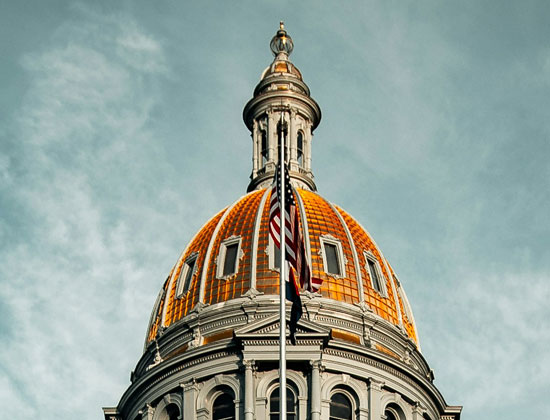Practice creates conflict of interest between lawyer and plaintiff By BEVERLY RAZON | Colorado Newsline…

Colorado lawmakers OK bills on AI, oil and gas, medical malpractice
Marissa Ventrelli marissa.ventrelli@coloradopolitics.com May 5, 2024
With the end of the legislative session looming closer, members of Colorado’s state House worked on Sunday to debate bills, hold a committee hearing and advanced several measures.
Proposed changes to AI task force advance
With a vote of 37-24, the House passed House Bill 1468, which aims to broaden the scope of the state’s facial recognition software task force to include the study of additional facets of artificial intelligence and biometric technology.
Lawmakers also adopted an amendment to allow the task force to study the effects of artificial intelligence and biometric technology on “vulnerable communities,” addressing points raised by parties and Judiciary Committee members regarding what they described as potential biases against people of color in facial recognition software and artificial intelligence.
All House Republicans voted against the bill, as did six Democrats. The bill, sponsored by Rep. Brianna Titone, D-Arvada, and Sen. Chris Hansen, D-Denver, will now move to the Senate.
Oil and gas package moves on to third reading
The House also advanced a pair of bills introduced in the Senate that resulted from a recent agreement between Gov. Polis, environmentalists, and oil and gas companies.
Senate Bills 229 and 230 will need a final vote in the House before proceeding to the Senate.
Senate Bill 229 directs the Colorado Department of Public Health and Environment to propose rules for the state’s air quality control commission to reduce oxides of nitrogen (NOx) generated by the oil and gas industry in “ozone nonattainment areas” by 50% of the 2017 baseline in the next six years.
Additionally, the bill removes certain restrictions on injunctions in environmental enforcement actions, grants authority to the energy and carbon management commission to revoke licenses and suspend permits for serious violations, and introduces a licensing requirement for oil and gas companies, alongside their existing permitting requirements.
Bill sponsor Rep. Jenny Willford, D-Westminster, who noted that the state has failed to meet federal ozone standards for the past 15 years, acknowledged the collaboration among parties involved in the deal.
“This bill is a culmination of years of work, of compromise, and of building a policy that gives everybody certainty around the direction that we are heading,” she said. “Breathing shouldn’t be dangerous, but in our state and particularly in the Front Range, it is often so unsafe that the state has to urge people to stay indoors.”
Willford claimed that 46% of the state’s NOx emissions and 36% of its volatile compound emissions (VOCs) come from the oil and gas sector, which is why the industry is being targeted with legislation.
Senate Bill 230 imposes new fees on oil and gas operators based on average oil and gas spot prices. The fees, which would help fund the state’s passenger rail and public transportation initiatives, are predicted to generate nearly $110 million in the 2025-2026 fiscal year, according to the bill’s fiscal analysis.
The bill also directs the Denver Metro’s Regional Transportation District (RTD) to prioritize its completion of the northwest rail line to Longmont and finish the N line, which would extend light rail north of Thornton to state Highway 7. The organization is required to submit a report by detailing its plans to fulfill these commitments by July 1, 2025.
The bill also imposes an oil and gas production fee for wildlife and land remediation.
Bill sponsor Rep. Elizabeth Velasco, D-Glenwood Springs, said the fees would bolster Colorado’s transportation infrastructure, especially as the state ranks No. 44 in the nation for state funding for local and regional transit. Velasco said it’s important to tackle public transit with climate objectives, as vehicles are one of the biggest contributors to emissions.
Rep. Gabe Evans, R-Hudson, raised objections to both measures, arguing that, in 2018, Colorado citizens voted against Proposition 112, a ballot initiative that would have increased the minimum distance between oil and gas wells and occupied structures, water sources, and other areas — like parks and playgrounds — to at least 2,500 feet.
Despite that rejected, Evans said, the legislature introduced a bill the following session that he said implemented “basically everything” from Proposition 112. While the bill, which was eventually signed into law, didn’t directly adopt the elements outlined in Proposition 112, it gave local governments the authority to set their own minimum distances for oil and gas wells in certain areas.
Evans added that the governor touted the passage of the bill as a compromise that marked “the end of the oil and gas wars in Colorado.” Disagreeing with that characterization, the lawmakers said the legislation negatively affected his district, which is the state’s largest oil and gas producing region.
“Two-thirds of of the folks left my church because they went down to the Permian Basin in Texas because that’s where the jobs were,” he said. “The hope was, as the governor said, this would end the oil and gas wars. That compromise position had finally been reached. But folks, we’re standing here again today because unfortunately, that compromise position was not reached.”
If passed without House amendments, Polis is expected to sign the bills into law.
House introduces bill on liability lawsuits
Another piece of legislation arose out a compromise between conflicting parties, this time dealing with liability law.
Supporters introduced House Bill 1472 in an effort to eliminate several ballot measures related to increasing caps on damages for medical malpractice. Under the bill, starting in 2025, the cap on non-economic loss or injury in civil cases will increase from $250,000 to $1.5 million. For wrongful death, the damages cap will increase to $2.125 million and will undergo biennial adjustments for inflation beginning in 2028.
The bill would also incrementally increase the medical malpractice wrongful death damages limit to $1.575 million over the course of five years, to be adjusted biennially for inflation thereafter.
Under the bill, the non-economic damages limitation for medical malpractice would increase to $875,000 over the course of five years, also to be adjusted biennially for inflation thereafter.
Also, the bill adds that a sibling may bring forth a wrongful death suit under certain instances.
Sponsor Rep. Kyle Brown, D-Louisville, said the bill symbolizes a compromise between medical malpractice attorneys and insurance companies. He added it has bipartisan support in both chambers.
“This has been truly a collaborative effort between both trial lawyers, as well as the medical community and the general liability community,” he said. “It’s the sort of coming together of these communities and working this out on behalf and for consumers and our frontline health care workers and our doctors, that we have crafted this compromise.”
The bill passed through the House Judiciary Committee unanimously and will make its way to the floor for second reading.


